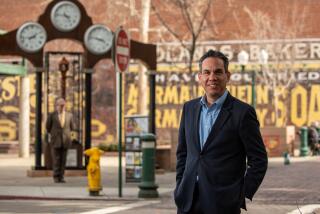Why I Won’t Run for Office in Alice-in-Wonderland Time
- Share via
My debate with myself began two months ago with a news story in the local paper that read: “Stewart Udall, 66, a former Interior Department secretary--and three-term Arizona congressman in the 1950s--said that he is considering running for Congress in the 4th District.”
What spurred my announcement was an angry conviction that our five-year fiscal hemorrhage had become a national scandal. I was outraged as Congress commenced another of its fatuous budget square dances and President Reagan again did his sidestep around the cancerous debts that will soon choke our economic progress.
In 1981 Republican Sen. Howard H. Baker Jr. of Tennessee had called Ronald Reagan’s economic experiment a “river-boat gamble.” I was appalled that a reckless President and a supine Congress were ignoring the damage that they were inflicting on America’s future. How could these “leaders” dare to substitute a gambler’s creed for the ethic of thrift that Americans had nurtured for two centuries? What right did this aggregation of cozy incumbents have, in the absence of a national emergency, to saddle future generations with a crushing burden of debt? Indeed, how could this century’s most conservative President justify a trillion-dollar deficit in a time of prosperity?
In my generation the two Presidents who did the best job of sustaining our national strength were Harry S. Truman and Dwight D. Eisenhower. They would surely be scandalized by what has happened in the 1980s. I served in Congress under President Eisenhower. At the end of his eight years in office the net debt of his Administration totaled $11 billion--an amount that the current crew will run up in the next 90 days! To Eisenhower, national security was synonymous with the preservation of the nation’s economic strength: He resisted the efforts of those who wanted to mortgage the future by piling up unneeded military weapons.
When I started thinking about running for Congress, I fantasized that a maverick with my background might gain an audience and have influence on events. I saw myself as a one-term truth-teller who could create enough drama to make each member of Congress feel responsible for his or her part of the national debt. I wanted to preach about the folly of free-lunch government--and lead a one-man crusade for big taxes on petroleum to help us reduce deficits and stay on a path of energy efficiency. And I envisioned debates where I demolished the apostles of the “new economics” who ignore the decline of American production and act as if we can somehow thrive as a nation of shoppers.
My fantasies were short-lived. A visit to Washington convinced me that it was foolish to think that one angry old-timer could make a difference. Few seemed interested in discussing the crumbling of the nation’s economic foundations. Fewer still thought that anyone could win an election by talking about belt-tightening and increases in taxes.
Amazingly, no one in Washington has the stomach to argue with Reagan about his monstrous deficits. Even the members of Congress who concede that the prosperity of the present is being purchased by annual deficits of $200 billion have persuaded themselves that a spurt of economic growth will correct things down the road.
After two months of discouraging observations, I decided a couple of weeks ago not to run for Congress. I concluded that politicians of both parties are so committed to an ostrich-like approach to the nation’s financial affairs that they would resent, and quickly tune out, any effort to persuade them otherwise.
The President’s soothing words have created an Alice-in-Wonderland world of economics where weakness is paraded as strength, where the nation with the biggest debts scolds countries that can’t make payments on their foreign loans--and where “big spenders” are faceless miscreants of some earlier era. The credit-card joy ride goes on, and no one wants to think about who will have to pay the bills when they come due.
Maybe just for the hell of it I should have gone ahead and filed anyway. But the final blow came when I realized the extent to which money is now the paramount force in American politics: The low-cost campaigns of the 1950s, in which people were more important than money, have been swept into a side pocket of history. There are times, I guess, when elders should shelve their sermons and crusades, remain in the bleachers and let the new generation make its own mistakes.
More to Read
Get the L.A. Times Politics newsletter
Deeply reported insights into legislation, politics and policy from Sacramento, Washington and beyond. In your inbox twice per week.
You may occasionally receive promotional content from the Los Angeles Times.










